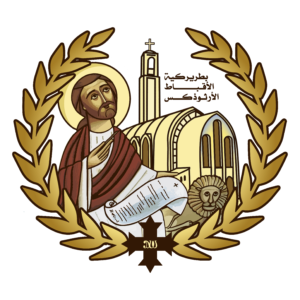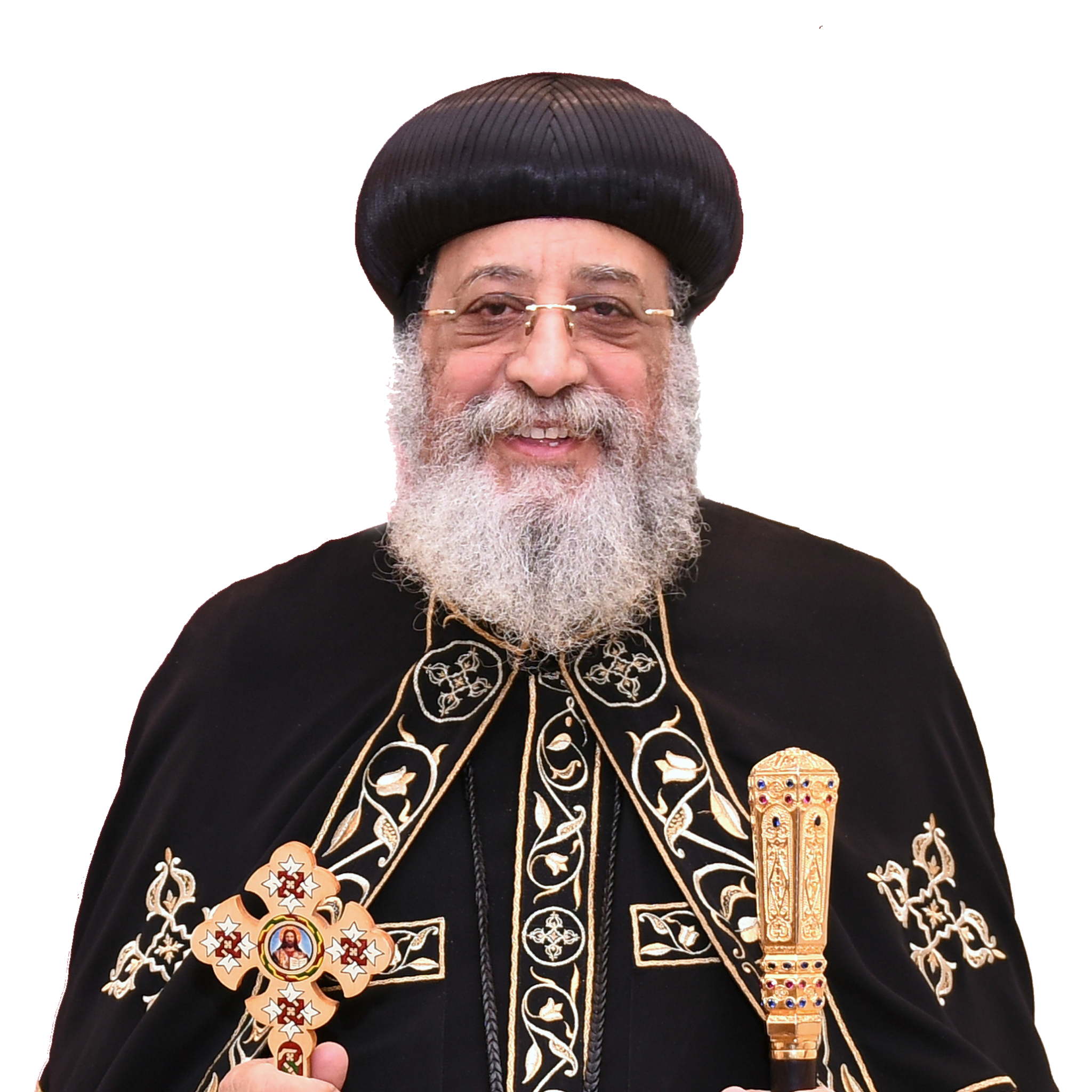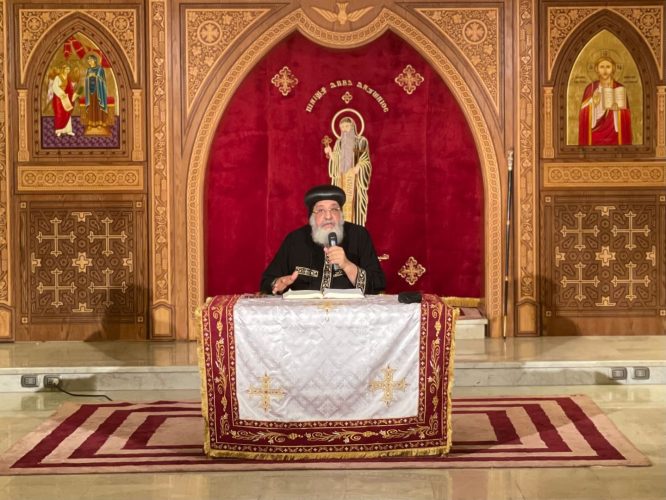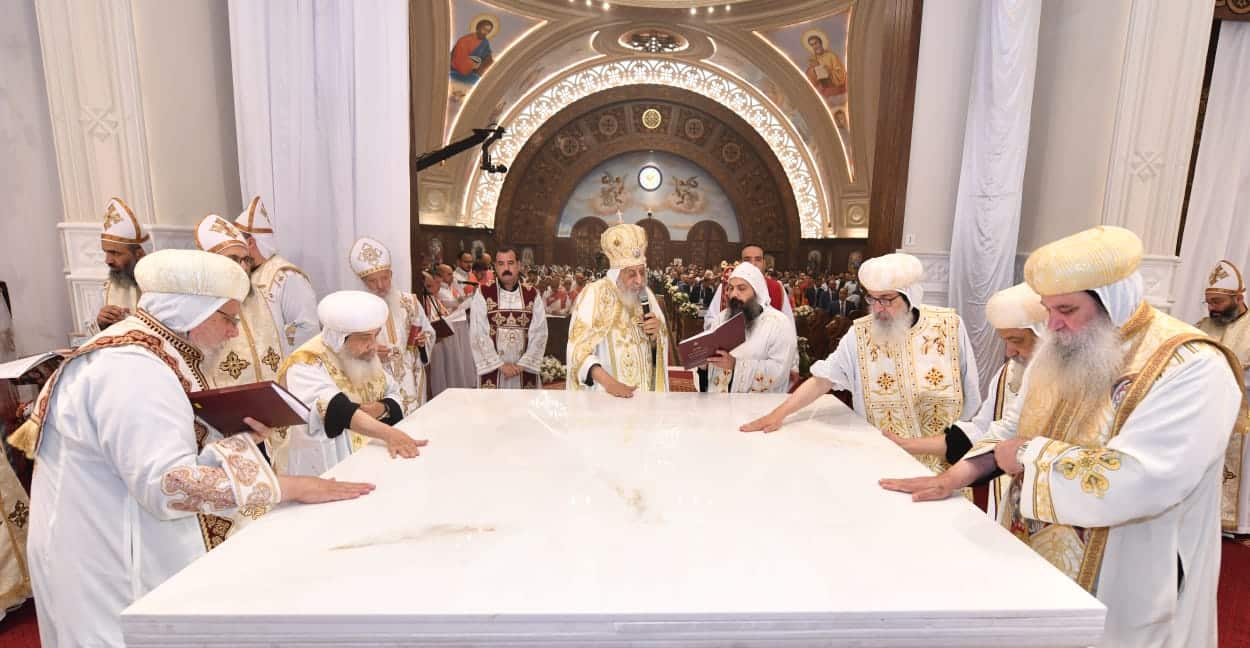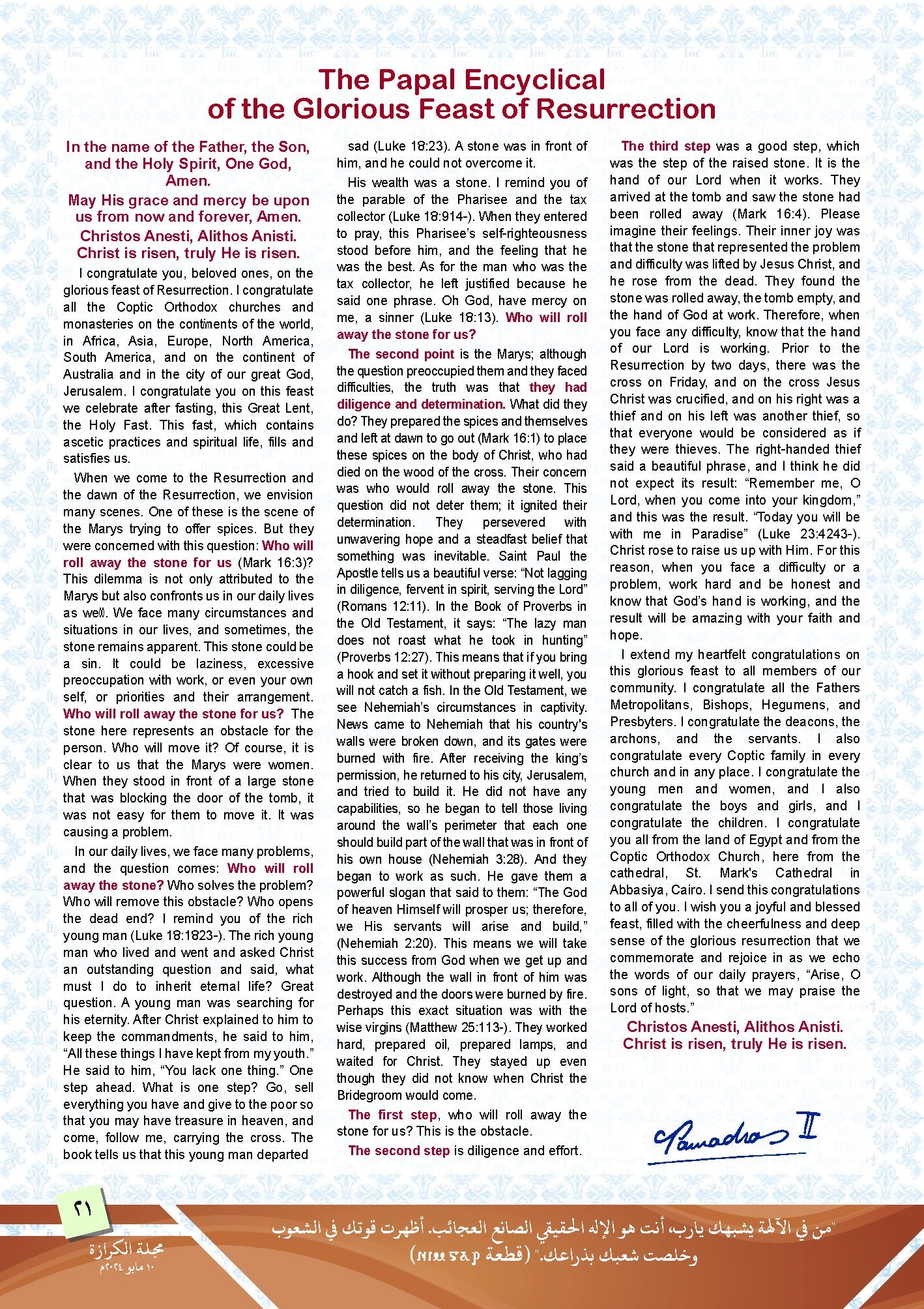This evening, H.H. Pope Tawadros II held his weekly Wednesday meeting from the Papal Residence in Cairo. The sermon was live streamed on Christian satellite channels and Coptic Media Center’s C.O.C. channel online.
H.H. continued his contemplations on Psalm 37 which he began last week during which he dealt with the verse, “Trust in the Lord and do good,” the Psalm’s third verse, through which he gave the Psalm’s first lesson – the lesson of trust in God.
H.H. began a new series of sermons last week on Psalm 37 that is full of commandments, which H.H. will address over the upcoming several weeks under the title, “Lessons of Wisdom.”
H.H. Pope Tawadros II congratulated the children of the Coptic Church on occasion of the beginning of the Coptic new year (1738 AM) which begins next Saturday, during which the Coptic Church celebrates the divine liturgy in its churches in Egypt and abroad. H.H.’s congratulations came at the beginning of his sermon at the weekly Wednesday meeting which was held this evening at the Papal Residence in Cairo.
In his congratulations, H.H. said: “At the outset, I’d like to congratulate you on the Feast of the Martyrs, the Nayrouz Feast, and beginning of a new Coptic year which we will be celebrate this coming Saturday. Nayrouz is one of the oldest Feasts and the feast on which we inaugurate the Coptic year; this history begins from the year 284 AD during time of the tyrant Diocletian one of the Roman Emperors. In this time, the era of severe persecution began, and the early Copts marked this day as the beginning of their calendar.
The Coptic calendar is arithmetic; each month contains 30 days, more or less in some months, and a 13th month is added to it called ‘the Little Month’ or ‘days of forgetting’ to adjust the calendar mathematically and in writing. All Church occasions are based on the Coptic Calendar. It regulates all our feasts, fasts and Saint feast days and their commemorations, as well as the daily reading in the Church of the day’s date through the Synaxarium; we say we celebrate on this day the commemoration of a Saint or Martyr, or an important church occasion, and the Church has followed this system. We publicly celebrate this day, of course, through the dates and guavas and their beautiful symbols, and they are joyous days from Thout 1, the first month till Thout 17 when we celebrate the Feast of the Cross, one of the first Feasts we celebrate at the beginning after celebrating the beginning of the Coptic New Year.
In the name of the Father, and of the Son, and of the Holy Spirit. One God. Amen. May His grace and mercy rest upon us, from now and forevermore. Amen.
I would like to congratulate you on the upcoming Feast of Nayrouz, also known as the Feast of the Martyrs. It is the oldest feast and is the celebration of the beginning of the ecclesiastical Coptic year, which began in the year 284 A.D. during the rule of the Roman Emperor Nicledianos. It was during this time that a great persecution arose, which is why Copts set this feast as a special calendar, a set-apart tradition. All of our feasts and fasts are based on this Coptic calendar.
Each of the Coptic year’s months are 30 days long, with the exception of the final month called “the short month,” also called “days of forgetfulness. This final month is in order to realign the year both numerically and astronomically. Happy New Year and may you be blessed.
And now let us continue our study on lessons in wisdom from Psalm 37. I will read the first 11 verses.
Sermon Highlights:
~ 3 wrong reliances (things to not put our trust in):
- ourselves (our own thoughts & understanding, our feelings, our physical strength)
- other people
- wealth/money
~ 3 indications to confirm that you are indeed trusting in God: a sense of joy, inner assurance, & satisfaction
Psalm 37
1 Do not fret because of evildoers, nor be envious of the workers of iniquity.
2 For they shall soon be cut down like the grass, and wither as the green herb.
3 Trust in the Lord, and do good; dwell in the land, and feed on His faithfulness.
4 Delight yourself also in the Lord, and He shall give you the desires of your heart.
5 Commit your way to the Lord, trust also in Him, and He shall bring it to pass.
6 He shall bring forth your righteousness as the light, and your justice as the noonday.
7 Rest in the Lord, and wait patiently for Him; do not fret because of him who prospers in his way, because of the man who brings wicked schemes to pass.
8 Cease from anger, and forsake wrath; do not fret—it only causes harm.
9 For evildoers shall be cut off; but those who wait on the Lord, they shall inherit the earth.
10 For yet a little while and the wicked shall be no more; indeed, you will look carefully for his place, but it shall be no more.
11 But the meek shall inherit the earth, and shall delight themselves in the abundance of peace.
The grace of God the Father be with us all. Amen.
Introduction
As we said in our meeting last week, this Psalm offers us a set of lessons on wisdom, and we all need wisdom in order that we may live life the right way. Last week we contemplated the first two verses and their wisdom-lessons were to not worry, to not be envious, and to not be angry or jealous of wicked or evil people because they will be cut down like the grass and all their success is deceptive and temporary. So then, what are we to do? Well, today we will contemplate this in the first lesson following the introduction of the first two verses, and the lesson is found in verse 3:
“Trust in the LORD, and do good” – that’s it, that’s all; just “Trust in the LORD, and do good.” This is a very nice and very clear piece of wisdom or advice: just trust in or rely on the LORD. But before we start talking about relying on the Lord, [which is the only One we should rely on], I want to talk to you about wrong reliances, or things we are not to rely nor depend upon; I will talk to you about 3 of the most common things we wrongly rely upon; things we wrongly lean and depend on for support. Let us take a closer look at each one of these three.
3 wrong reliances (things to not put our trust in)
1-Yourself (self-reliance):
… 1- Don’t trust/rely on your thoughts
Self-reliance is when a person completely relies on their own intellect, knowledge, and understanding. They have made a god out of their own minds and they feel that their own minds and thoughts are supreme. The most popular manifestation of this are people who are atheists. They fall into this problem of “My mind can think and figure this out. My mind is my god and I do not need anyone else.”
The Bible tells us to “Trust in the LORD with all your heart, and lean not on your own understanding” (Prov 3:5), and in reality, a person who relies on their own thinking or understanding opens a very wide door for Satan and his thoughts to enter in and mess with their mind. Satan will put wrong thoughts in that person’s mind and begin to change and rearrange things in that person’s mind; this person has now become like a toy in the hands of Satan. In order to clarify this point, let us take some examples of this from the Bible.
In the Old Testament, the prophet Moses relied on his own thinking and said, “I want to deliver (liberate) my people,” so what are you going to do Moses? Here is what it says in the Old Testament: “When Moses was grown … he went out to his brethren and looked at their burdens. And he saw an Egyptian beating a Hebrew, one of his brethren. So he looked this way and that way, and when he saw no one, he killed the Egyptian and hid him in the sand” (Exo 2:11-12).
Moses relied on his own thinking. He had a disagreement with someone, he looked right and left, saw that no one was looking, and decided to kill the man and hide him in the sand. He used violence and relied on his own human thinking. And as soon as Pharaoh heard of the matter, [he sought to kill Moses] and Moses feared and began to flee (Exo 2:15).
God knew that the time had not yet come for [God’s] people to be released and that Moses was not yet ready to lead them, so the Lord told Moses, “Moses, come, let Me prepare you.” And so Moses’ self-reliance was wrong.
… 2- Don’t trust/rely on your feelings
Depending on one’s own feelings is another form of incorrect self-reliance. The Book of Proverbs 28:26 tells us, “He who trusts in his own heart is a fool, but whoever walks wisely will be delivered.”
Let us take an example from the Old Testament to demonstrate this point. Rebekah. Rebekah relied on her emotions and her greater affinity toward her son Jacob, more than Esau, so she suggested to Jacob that he take his father Isaac’s blessing by way of deception. Rebekah used wrong means to accomplish her desire to see her more beloved son, Jacob, get the blessing. And so what was the result of her reliance on her emotions to accomplish her desire? Well, she caused Jacob to have many problems later on.
Another example of the incorrect reliance on emotions can be seen when couples are entering into relationships or marriage; when people agree to marry based just on emotions and not based on having rightly thought the matter through. But we have an intellect and that intellect must think and consider things through, and there is also guidance [of others] that ought to be taken, or the consideration of the opinion of family or elders or of others in general. If this is not done, problems begin to arise. Emotions last only for a short while and then subside, and when they subside, problems begin to arise and then the person feels lost and finds themselves saying, “I wish I had never done this … I wish I had never agreed to this … I wish I had never thought this way,” and so on.
A person must be balanced because God has given him many capacities: a mind, emotions, and also faith, and so when I come to take a decision in life, I am to use all of these combined together and not rely only rely on one of them alone, because there are people who rely solely on their intellect, others who rely solely on their emotions, and others who rely on their physical strength.
…3-Don’t trust/rely on your physical strength
One of the best examples of someone who relied on his own strength was Goliath, from the story of David and Goliath. Goliath “defied the armies of the Living God” (1 Sam 17:36) and bragged about his physical strength. And as he stood there one day feeling invincible, here came David, young, small in stature, and not at all physically strong. In fact, David was so small in size that even the protective gear was too large for him, so he came to Goliath unprotected and unarmed, not even carrying a sword. In going to face Goliath, all that David brought with him was a sling and five smooth stones, and we know, these are not weapons of war.
And the Book of 1 Samuel 17 goes on to tell us that while Goliath relied on his own strength, David relied on God, and as they faced one another, we read, “45 Then David said to the Philistine, ‘You come to me with a sword, with a spear, and with a javelin. But I come to you in the name of the Lord of hosts.’” And where is this name of the Lord of hosts? It is in my heart. I am not relying on my physical strength nor on my thinking nor on any other capability or capacity I may have. I am relying on something that is with me that is much greater than all of that: my faith in God’s Presence. My faith that God [Himself] will give me the victory.
And so it was that David’s stone landed on a very small, exposed point on Goliath’s forehead and killed him, and so Goliath died and David had the victory. And so the first form of wrong reliance is self-reliance – whether on one’s own intellect, thinking, understanding, or on one’s own emotions, or on one’s own physical strength. Let us remember that today’s wisdom lesson says: “Trust in the LORD, and do good.”
2-Relying on others
Let us look at another form of wrong reliance or misplaced trust: relying on others. [This is revealed when we make statements like], “Oh yes, I know such and such person [and he is very this or very that],” and so on.
Psalm 118 has a very beautiful verse that says, “It is better to trust in the LORD than to put confidence in man. It is better to trust in the LORD than to put confidence in princes (human leaders)” (Ps 118:8-9), which reminds me of another Scripture that says, “The name of the LORD is a strong tower” (Prov 18:10).
The name of the Lord is like a fortress around a person, surrounding that person’s life, and that is why one of the nice traditions of the Church are the short- or arrow-prayers, which are like a protective fortress, specifically, the Jesus Prayer, where we say, “Lord Jesus Christ, have mercy on me, a sinner,” because the mere mention of the Lord’s name creates a fortress around a person, so is the making of the sign of the cross; both are means to help us remember to rely on Him.
When we rely on people we are forgetting that God has a Hand in everything, that He is the One orchestrating every matter and that all things work together for those who love God, but we put all this off to the side and we go on relying on people. The prophet Jeremiah said, “Cursed is the man who trusts in man and makes flesh his strength, whose heart departs from the LORD” (Jer 17:5).
Cursed?! To that extent? Oh yes, and so be careful about this. Again, let us go to the Old Testament for some practical examples of those who relied on others. Righteous Joseph was sold by his brothers, and while in prison, Joseph [interpreted the dream of Pharaoh’s cupbearer and told him], “You will be restored to your position and when you are, please show kindness to me and make mention of me to Pharaoh, and get me out of this house (prison)” (cf Gen 40:13-14). But Joseph, why did you rely on a man?
And what does the Bible tell us that this man did? It says, “Yet the chief butler did not remember Joseph, but forgot him” (Gen 40:23), and this shows us that it was from a moment of weakness that Joseph trusted and relied on another human. The cupbearer was released from prison and forgot all about Joseph, but God had His own timing. “To everything there is a season, a time for every purpose under heaven” (Eccl 3:1); God has a specific time for when to use everything.
Let us take another example, that of Moses and Pharaoh. Pharaoh of course had a group of [wise men], sorcerers, and magicians whom he depended upon and took counsel from during the time of the [10] plagues (cf Exo 7:11). When the first plague came, these magicians were able to imitate Moses and Aaron and turn the water to blood, also in the second plague, that of the frogs, but when it came to the third plague, that of the lice (or gnats or flies), they were not able to do anything. And so as they stood there unable to imitate [what Moses and Aaron had done], the magicians said to Pharaoh, “This is the Finger of God,” (Exo 8:19), as if to say, “This is something beyond our power to duplicate, beyond our knowledge or understanding.” This is the Finger of God.
And the plagues continued to come, one after another, until Pharaoh finally gave Moses [and God’s people] permission to leave. Pharaoh had been let down by his magicians and sorcerers, and his and his army’s life ended by drowning in the sea. Trusting in humans. Let your trust always be in the Lord; this is the first wonderful wisdom-lesson, to trust in the Lord and do good.
As you trust in the Lord and remain faithful and honest in all you do, it will become obvious how the Lord is the One who is working all things in your life- “He shall bring it to pass.”
3-Relying on wealth/money
A third form of wrong reliance is when we rely on wealth or money, and as our Lord Jesus Christ teaches us, “No one can serve two masters … You cannot serve both God and money” (Lk 16:13). And so in this case, a person makes money their God because they are putting their trust and reliance on money.
The Book of Proverbs tells us, “Those who trust in their riches will fall” (Prov 11:28, NIV). There is a difference between money and the love of money. Wealth and money are a blessing from the Lord, a blessing that helps us to meet the expenses and demands of life, but the love of money, that is what the Book calls “a root of all kinds of evil” (1 Tim 6:10), and we can see that this [truth is at the core of all] the conflicts and wars across the world today.
Is money your servant or your lord? A great illustration of this is the rich young ruler (Lk 18:18-23). That he was a “rich young ruler” meant that he had energy and vitality (young), and money (rich ruler). And when he met Christ he knelt down on his knees, so he was also very well-mannered, and he also asked a very wonderful question: “What shall I do to inherit eternal life?”
Christ told him to keep the commandments and he answered, “All these things I have kept from my youth … look, I know all the Commandments: one, two, three,” and so on. It then says, “22So when Jesus heard these things, He said to him, ‘You still lack one thing. Sell all that you have and distribute to the poor, and you will have treasure in heaven; and come, follow Me.’ 23 But when he heard this, he became very sorrowful, for he was very rich.”
Christ told him, “You are very close, [but] you lack only one thing: go sell all you have and give to the poor, and you will have treasure in heaven; and come, follow Me.” Christ told him this because this was the man’s weak point: “Go, get rid of your money,” could you do that?
But look at how he responded, it says, “23 But when he heard this, he became very sorrowful, for he was very rich.” The riches were holding onto him, and this is why some of the Church fathers have called this man “the sad young man,” instead of “the rich young man.” He became sorrowful and walked away sad because this (money) was what he trusted in and relied upon.
I wonder what this man’s end was? We do not know. Psalm 49:10 says, “Likewise the fool and the senseless person perish, and leave their wealth to others.” The rich young ruler perished, and the story that began with “What shall I do to inherit eternal life?” came to an end.
Another similar example is the parable of the rich fool (Lk 12:13-21). The rich fool saw that he had much fruit and much wealth and much harvest, and, and, and, and it says, “So he said, ‘I will do this: I will pull down my barns and build greater, and there I will store all my crops and my goods and I will say to my soul, “Soul, you have many goods laid up for many years; take your ease; eat, drink, and be merry.”’ But God said to him, ‘Fool! This night your soul will be required of you; then whose will those things be which you have provided?’” (Lk 12:18-20). This is the reliance on money.
Use money, let it be your servant, use it to serve others. We hear stories of how some people save money and want to leave it for their children as an inheritance, this is well and good, but if money is all you leave them for an inheritance, then it will be a cause for the corruption of these children [and their relationships], one with another, as we so often hear of family members going to court and getting into conflicts with one another.
But there is a smart person, that one says, “Yes, I want to leave my children an inheritance so that they can live well, but there is something even more important than that that I want to leave them with; an inheritance of love, so that they grow up loving one another.” And an inheritance of love will make your children always bless you when they remember you and they will be loyal to you, whereas leaving an inheritance of money with no love creates a distressful situation and no one will remember you. The rich fool is an example of one who relies on money or riches.
And so these are three examples of things we are not to rely on: we are not to trust or rely on our own selves, nor on others, nor on riches or money. This is what the Psalmist tells us first, to give us the negative picture, which prepares us for the thing we are to trust and rely upon, which is our lesson for today. The positive side of where to put our trust is: “Trust in the Lord, and do good.” This is a life lesson, a wisdom lesson.
In the Psalms it tells us, “Taste and see that the Lord is good; Blessed is the man who trusts in Him” (Ps 34:8). A person who trusts in the Lord is carried, [lifted, supported by God]. How lucky you are if you rely on the Lord! He will work out and take care of everything [for you], He will make the way easy before you! So now you have seen both sides of trust – the negative and the positive, the true.
St. Mari Isaac says, “Trust in the Lord and surrender yourself to Him, because He who was with His servants during their difficult times and delivered them and revealed His power in [and through] them, will [also] be with you and will keep you.” Trust in the Lord and [really] sense that trust in Him.
“I have set the LORD always before me; because He is at my right hand I shall not be moved” (Ps 16:8). How beautiful! You set the Lord before you – all day long you are seeing the Lord, as if He were standing before you, and “because He is at my right hand” – the right hand is an expression of power or strength, and so because He is my strength and because I trust, rely, and lean on Him, I will not be moved.
And when it comes to people, as the proverb goes, sometimes we seek them to support us, and discover that it is they who need support, [so they are of no help to us at all.]
A person who trusts in the Lord surrenders their entire life to Him and gives the Lord permission to be with them at all times, “Lord, be my life-Companion. Walk with me and let me lean on You.” I really like the 23rd Psalm where it says, “Though I walk through the valley of the shadow of death, I will fear no evil; for You are with me” (Ps 23:4). No matter what troubles or distresses I may go through, because You, Lord, are with me, that is why I will not fear. I know You are with me, I trust and lean on You through all things.
But I want you to know that there is a very big difference between trusting and relying on the Lord versus dependency, laziness, carelessness, or not thinking for ourselves, no, or else why did the Lord give us our intellect? Or why did He give us the ability to think or give us all this modernity and technology which humanity has today? Why?
St. John Golden-mouth says, “Grace does not come to us as we lay on our backs.” This would be like if it were raining outside and a person is reclining on their back indoors and saying, “I can’t find any water.” No, you must get up and make some effort. Prepare some vessels so that you can collect the water which will serve you later on.
Examples of those who trusted in the Lord
The clearest example of this from the Old Testament is our father Abraham. God said to Abram (his name before God changed it to Abraham), “Go from your country, your people and your father’s household to the land I will show you. I will make you into a great nation, and I will bless you; I will make your name great, and you will be a blessing” (Gen 12:1-2). This was from the Book of Genesis, and in the Book of Hebrews it says, “By faith Abraham obeyed when he was called to go out to the place which he would receive as an inheritance. And he went out, not knowing where he was going” (Heb 11:8).
Abram was living in Ur of the Chaldeans when God told him, “Leave your land and your people and your father’s house and come with Me.” This was a call, an invitation from the Lord, and Abraham said, “Yes Lord,” and he followed God event though he did not know where he was going. And he walked through the deserts – through the area of Northern Iraq and Syria, all the way until arriving to the land of Palestine.
We often say of a person who lives with trust in the Lord is that he is “one who has surrendered his life to the Hand of the Lord.” For example people who consecrate themselves, whether to a place, like a monastery, or to a way of life, or to a service, and so on. That person remains faithful to the Lord and God plans his ways and his life goes smoothly, and that person feels as if they were being carried in and by the very Hand of God.
Another example [of one who trusted in the Lord is] King Hezekiah (2 Kg 18:17-37). When Sennacherib, King of Assyria, came to fight against him, King Hezekiah said, “The Lord will surely deliver us; this city shall not be given into the hand of the king of Assyria” (2 Kg 18:30).
And King Sennacherib started to ridicule King Hezekiah and sent him a messenger saying, “Come now, make a bargain with my master, the king of Assyria: I will give you two thousand horses—if you can put riders on them!” (2 Kg 18:23) – mocking him. And it tells us, “When King Hezekiah heard it … he tore his clothes, covered himself with sackcloth, and went into the house of the LORD” (2 Kg 19:1) … and he sent a message to Isaiah the prophet asking him to pray for him.
And it tells us, “That night the angel of the LORD went out and put to death a hundred and eighty-five thousand in the Assyrian camp. When the people got up the next morning—there were all the dead bodies!” (2 Kg 19:35, NIV). A single strike by a single angel! And Sennacherib fled and resorted to his god in his own temple, and his son came in and killed him with the sword and Sennacherib died (cf 2 Kg 19:37).
And so this is a story about trusting in God and in God’s help, and how God is able to send a single angel that can resolve or destroy every problem and leave us victorious, all because we trusted in Him, but the one who trusted in false gods completely perished.
I plead with you, know that living with God, trusting in Him, and doing good [is the way of wisdom]. If you are trusting in God, here are 3 indications that will confirm this to you:
3 indications to confirm that you are indeed trusting in God
1-Joy
If you are trusting God you will be joyous because God will be leading your every step, as it tells us in Psalm 5:11, “But let all those rejoice who put their trust in You; let them ever shout for joy, because You defend them.” Continuous joy, joy.
We see this in the story of Moses and the people crossing the Red Sea, with Pharaoh and his army pursuing them. Pharaoh and his army drowned in the sea but Moses and the people made it over to the other side, and when they did they sang a joyous song, which is what we call “The First Hoos” and is part of our Church Praises: “I will sing to the Lord, for He has triumphed gloriously! The horse and its rider He has thrown into the sea!” (Exo 15:1), and we sing it with a melody of great joy! So this is the first indication that we are trusting God, when we feel joy.
2- Inner assurance
The second indication that you are trusting God is a sense of inner assurance. You will have a sense of inner confidence that the Lord is handling all of your affairs. How He will work it out, you do not know, but you are assured that He will work it out, and so you don’t walk around living life carrying a burden of worry.
Inner assurance is a form of inner peace, where one’s attitude is, “Lord, I will do my part and the rest is up to You. I trust You Lord.” I remember a young man who had been studying very hard and sometimes the exams would be very difficult, but he would do what he could. He would study, work hard, persevere, pay attention, and so on, and every time he would go into the examination hall not knowing how he would do and coming out not knowing how he had done, but he would always be happily surprised with a good result. He had trusted and relied upon the Lord. Yes, it may be that his family’s prayers for him helped him, and his teachers’ support too, but what helped him first and foremost was his trusting on the Lord.
3- Satisfaction
The third indication or sign that you are trusting in the Lord is that you will be satisfied. A person who trusts and relies upon the Lord will be a person who is satisfied and he will never grumble nor complain. And as I told you last time, Psalm 37 is a cure for complaining, it even starts out that way! He begins the Psalm by saying, “1 Do not fret because of evildoers, nor be envious of the workers of iniquity. 2 For they shall soon be cut down like the grass, and wither as the green herb.” This is the introduction to the Psalm and it is the first of its lessons on wisdom.
Trust in the Lord, and when you do, a sense of satisfaction will be a sign of confirmation to you. An example of someone [from the Old Testament] who was satisfied is Ruth. We all know the beautiful story of Ruth, how she was far from her homeland, had become widowed and lived a difficult life, and yet she trusted in the Lord and continued to cling to her mother-in-law, Naomi. And we saw how the Lord took care of Ruth’s life and led her to meet Boaz, and how she ultimately became part of the Lord Christ’s lineage.
Conclusion & Blessing
The summary and conclusion my brethren is that you are to trust in the Lord through your faith, through your waiting and patience. Trust in the Lord and depart from worry. Trust that the Lord’s Hand is guiding you and that your life is being moved and led by the Lord, and this trust in the Lord is what will give you a sense of joy, a sense of inner assurance, and a sense of satisfaction, and will remove from you any spirit of grumbling or complaining.
But the even more wonderful thing is that the Lord will be the One to bring you success. Trust in the Lord and be sure that it is this very trust that will give you a joyous life. In the Psalms it tells us, “I waited patiently for the LORD; and He inclined to me, and heard my cry … Many will see it and fear, and will trust in the LORD” (Ps 40:1,3).
“Trust in the Lord, and do good.” Do good, in any and every way possible for you to do and do not wait for anything in return, and know that the Lord will give you even greater blessings. He will give you joy, inner assurance, and satisfaction, and these blessings will give you a good life.
May Christ keep you all in His holy Name, with these lessons in wisdom and this lesson in trusting the Lord and doing good. To our God be all the glory and honor, from now and forevermore. Amen.
This page is also available in:
العربية
